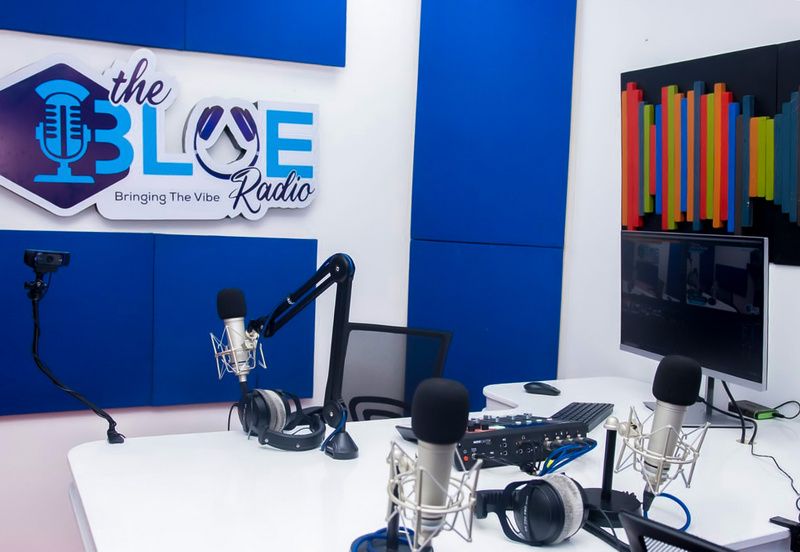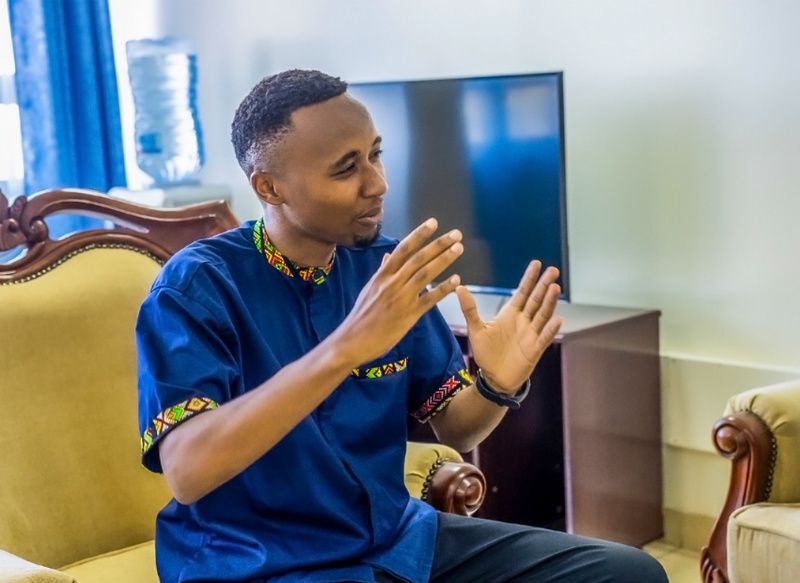Blue Radio entertains and educates young coastal listeners about opportunities available within the marine ecosystem.
Using radio to save the ocean and create jobs – an online station started by two students shows how

Blue Radio entertains and educates young coastal listeners about opportunities available within the marine ecosystem. Its founders aim to raise awareness about existing and untapped possibilities in the Blue Economy – and raise environmental issues at the same time.
By Atieno Odera, bird story agency
“Jambo listeners, Karibuni sana to the Blue Drive show. We know it’s been a long day at work, and you can’t wait to get home. We are here to ease your stress with good music, good vibes…” Diana Wambui’s voice reverberates from the radio as the music slows to a stop in the background.
“Kama kawaida here at Blue Drive, we talk about all the opportunities available in the Blue Economy. As young people, it’s good to know and explore the many opportunities we can venture into, don’t you agree, Shirley?” says Wambui as she hands the baton to her co-host.
“Yes yes! And right now, Diana, there is a lot of waste in the ocean. Today, we will be pointing out some solutions to not only clean the ocean but also make money from it.”
And so begins a 4-hour show, hosted from 4-8 pm every Monday to Friday on Blue Radio.
The two presenters will explore different ideas around the Blue Economy, allowing listeners to call in with their thoughts or questions, some of which are shared through the radio’s mobile app.
Blue Radio is an online radio station currently highly popular in the coastal city of Mombasa.
Over four million Kenyans who live in the Kenyan coastal communities depend on the ocean for their livelihood. Despite this dependence, the Blue Economy is far from delivering its full potential in the local economy.
According to the World Bank, the Blue Economy refers to the sustainable use of ocean resources for economic growth, improved livelihoods, and jobs while preserving the health of the ocean ecosystem.
In 2021, Kenya launched the GoBlue project to create more jobs for youths and women in the Blue Economy. Despite these steps, one of the biggest challenges is the public lack of information, especially on available opportunities.
This is the gap that Gilbert Were (25) and his partner Johnson Muema (25), are seeking to fill. Their online radio startup, Blue Radio Kenya, promises to the education coastal youths about the Blue Economy, its opportunities and its importance.
The journey to launching Blue Radio started in 2019 after a pitch competition with TechBridge Hub, the Mombasa-based Kenyan branch of TechBridge.
“I wanted to do positive storytelling. They were looking for the best tech ideas but I was coming in with an idea that was merging technology and media,” shared Gilbert Were.

From the competition, they were awarded 100,000 shillings (US$ 721) and seed funding of 70,000 shillings (US$ 505), which helped them start their business.
“We basically started operations from home. We had a laptop. We would go to the field with our camera, get the stories we wanted, come home, edit and publish,” shared Were.
From there, there have been many steps to learn and grow. This has included training to hone their entrepreneurial and business management skills.
“Last year, when we got a call from Mahmoud Noor, the Founder of Swahili Pot Hub and Pwani Innovation Week, inviting us to take part in the Pwani Innovation Week, we went for it. The big question for us was, what was this one thing we can come up with to improve our module? We immediately knew that it was time to talk about the Blue Economy. It had always been there with us since we started, but we just did not have the right platform,” shared co-founder Johnson Muema.
With more support and funds from the event, Blue Radio has been up and running since September 2022.
The target audience, as Muema shares, is Generation Z.
“We are targeting young professionals and youth around the coast, especially Generation Z. These are the most users of smartphones, and we want to channel this information directly to their gadgets.
We are sharing with them the different opportunities in the blue industry. We are inviting people from the industry who have the relevant information for our listeners, where we hold talks and direct engagements with our listeners,” he said.
As they share, the reception has been very positive, with different government bodies joining hands to work with them, while stakeholders within the industry join in to make the most of the platform as well.
“It is so empowering to be able to reach young people who are working in those areas or who have interests in joining the industries within those areas. They are very interested in the programs we have been hosting because we have on-air marine experts that can directly address their interests and concerns,” added Muema.

Having been introduced to online radio seven months ago, Elijah Nyange, a frequent listener, shares that the programs are not just entertainment but very educative.
“Blue Radio is the best online urban radio. I enjoy most of the breakfast shows. Shoutout to the hosts, who are always a vibe. I’ve seen it grow, and I pray it continues lifting the youths around. I’ve recommended some friends to listen to it, and the response has been awesome,” he shared.
The radio station employs over eight permanent staff members, several correspondents and 11 journalism interns. And last year, they won the Under 30 Mediapreneur Award at the Founder of the Year Awards or FOYA.
Muema and Were’s dream is to build their station into a full-blown media organization, which is still very expensive at the moment.
“The worry is that our content is still not reaching the ordinary citizen. Especially those who cannot afford to pay for the internet to access online content freely. Some do not also have smartphones, while the blue economy covers even the people working as fishermen and vendors.
If we can reach these people, we can scale, create even more job opportunities for young people, and grow our revenues,” Were said.
bird story agency




